
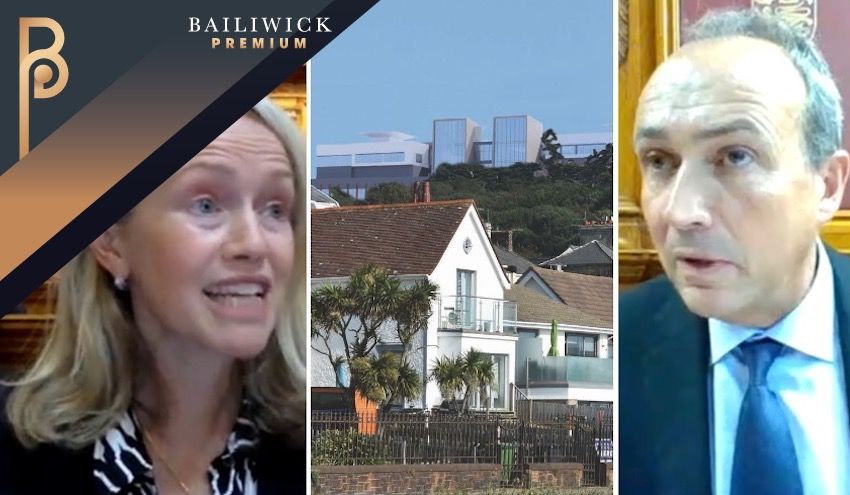

Express has documented, blow-by-blow, what every single politician had to say in the hospital debate. Find out what your elected representative said here…
States Members were this week asked to approve the Government's plan on how it wants to fund the building the new hospital at Overdale.
The debate opened on Wednesday morning with a complexity that only the States Assembly can conjure.
Before the main debate, Members had to debate the two amendments to it.
To kick off, the Council of Ministers accepted Constable of St Helier Simon Crowcroft’s amendment, but only with amendments that they themselves had made to it.
The Constable accepted the amendments that the Council of Ministers had made to his amendment to their original proposition.
Therefore, there was no debate or vote. In essence, the amendment ensures that the impact on any trees or amenity spaces will be limited and that landowners who’s land compulsorily purchased will get a fair price.
With that quickly settled, the main debate began with an opening speech by Deputy Chief Minister Lyndon Farnham, who leads the Our Hospital project...
He said that the need for a new hospital was accepted by all, with the case for one approved in 2012, when the Assembly charged the Council of Ministers to come up with a proposal.
11 years on, this had been completed, he said, but no previous incarnations could be compared to the current plan, which brought all services on to a single site, including adult and children’s mental health services.
He said that from a standing start in 2019, the project would be delivered by 2016.
“The current health budget is around £230m per annum,” he said. “Over 40 years that equates to £15-20 billion in delivering health services. “It is essential that we make right capital investment informed by experts and clinicians to enable us to deliver that £20 billion of future investment.
“I urge Members to think of the future, to a time when new hospital is open,” he said. “We must understand its value – which will not just be financial, but providing the best care throughout its lifetime.
“That value will attract best practitioners, it will provide better care, give patients dignity, and – most importantly – provide the sort of value that we enable us to save more lives.”
The Senator added that an extra – as yet unquantified – benefit will be the freeing up of land currently in the health estate that could be used for housing.
Presenting the amendment to cap spending at £550m and ensure no more is spent without the approval of the States Assembly, Senator Moore said that the pledges made by the Council of Ministers when they supported the rescindment of the decision to build a £466m new hospital in Gloucester Street had not been met.
These included providing a digital strategy, linking healthcare with Guernsey and the UK, and providing a health model that covered the lifetime of the new building.
“The Government’s proposition does not achieve what was promised then and is based on inadequate information,” she said.
She reiterated the conclusions of her panels own expert advisers, who had found that the funding proposal was “dogged by an insufficient evidence base and poor process”.
In selecting Overdale as the preferred site, the Citizens’ Panel was not been asked to consider matter of affordability, she added.
“The access debate followed in February, and our advisers expressed concern over the lack sufficient information and rigour. Today, we are her to consider the Outline Business Case for a project of a scale never before contemplated in Jersey.
“Our advisers say that size and scale of the hospital is not justified and the OBC does not provide the necessary justification.”
The Senator referred to other hospitals which had been built for significantly less than the £804.5m proposed for Jersey. She cited Madeira (365m euros), Mallorca (375m euros) Guernsey (a new £130m wing for £29.5m) and Glasgow (£842m for over 1,000 beds).
She also said that the UK Prime Minister had recently pledged £2.6 billion to build six new hospitals and update others.
On the Government’s borrowing approach, she said: “If gamble pays off it could be great but it is a risky route. A lot can happen over 30-40 years ahead. If there is major correction, like the 2008 crash, the Treasury does not back up plan.
“We cannot print money or alter interest rates which is why, as a small island nation, Jersey has taken a prudent approach and avoided large scale debt.
“Who or what will bailout Jersey if borrowing which is equivalent to a year of revenue goes wrong? We cannot have an approach based on little more than a hope that global economy won’t change.
“The Government is proposing an inordinate and unsustainable level of expenditure, which shall fall on the shoulders of poorer members of society.
“The purpose of this amendment is not to stop the project; It is simply to put it back of tract, because it has come off the rails.”
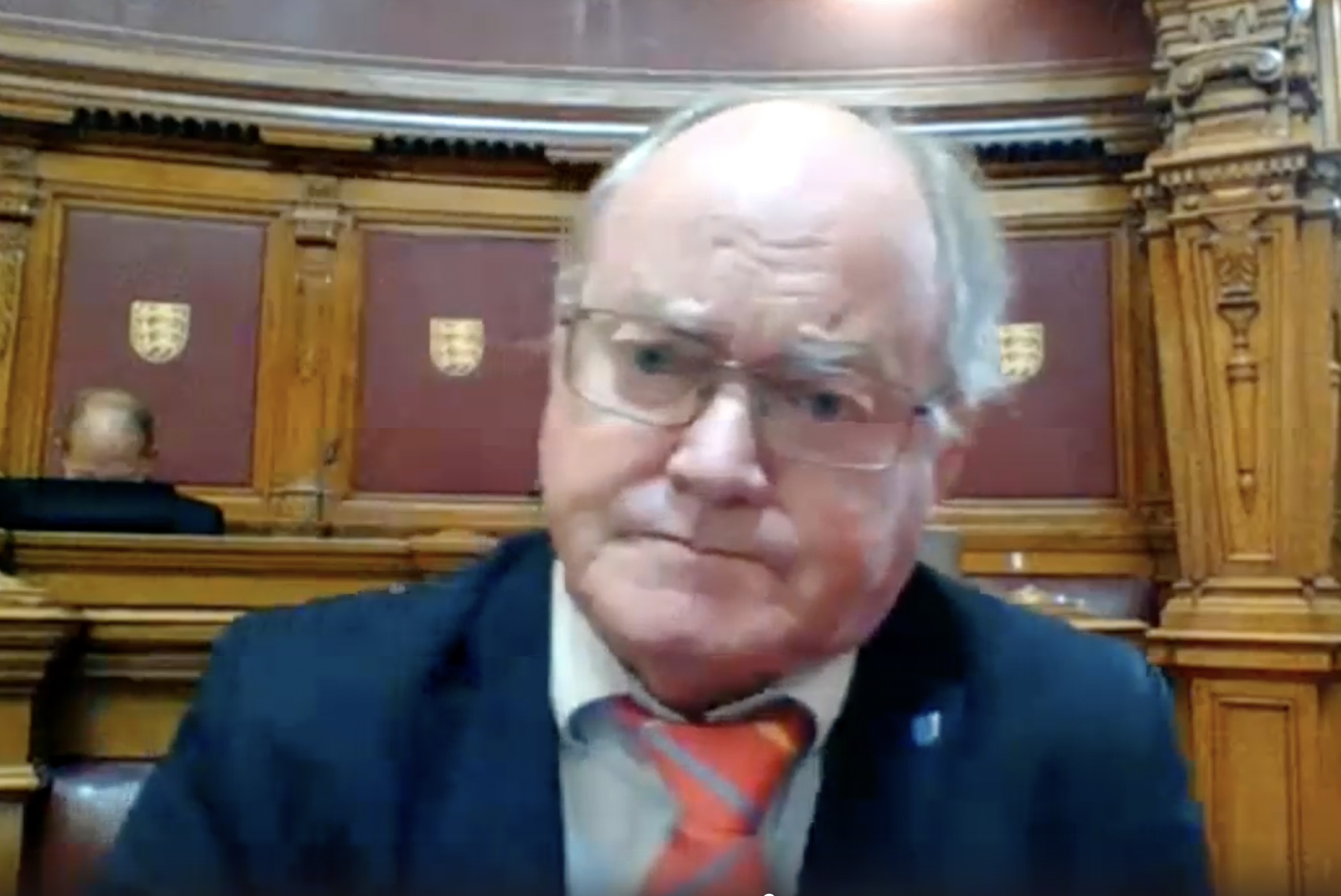
Constable Simon Crowcroft said he supported the decision to build the hospital at Overdale but he would be minded to support the Scrutiny amendment if it would lead to a revision of the access plans, which currently involve straightening and flattening sections of Westmount Road.
He said: "My key questions for the chair [Senator Moore} are: will supporting this amendment lead to a reconsideration of the intractable civil engineering projects, such as the destruction of the Jersey Bowling Club and other collateral damage?
“Is there is a change to come up with ‘Jersey-fied approach’ for accessing the hospital which places much less reliance on the car? Could something be arrived at to spare the Jersey Bowling Club? And would it involve the compulsory purchase of parish land?”
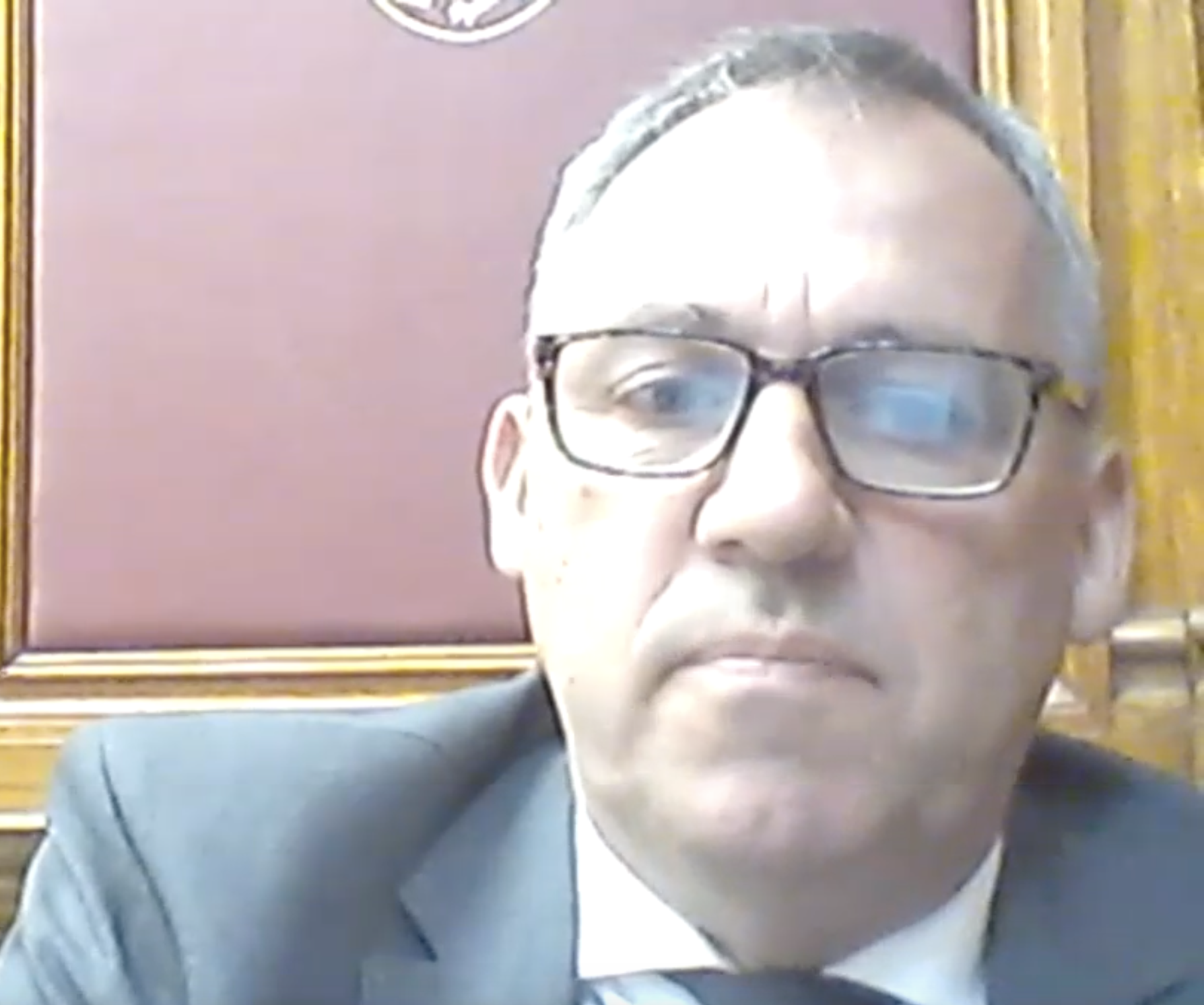
The Constable of St. John, who was not in the Assembly when Overdale was chosen, was highly critical of the amount of detail included in the Outline Business Case.
“Prior to politics, I spent four decades in the commercial sector,” he said. “The lack of basic information before us today would have never been acceptable. Where are the revenue costs, the staffing levels, the justification for its size, the amount of car parking needed? This document would never get to board level in the private sector.”
He added: “I was approached by a leader in construction industry in Jersey, who was speechless at the amount of contingency and optimum bias. As a businessman, he said, I would never accept those levels; you have to force the contractor to come up with a budget.
“If you put in that much contingency, it will be spent.”
The Constable also questioned why the hospital project still only had an interim manager, when he had been told a permanent appointment would be made in the second quarter of this year
He also raised concerns about the amount of debt the Government was getting itself into, which included the debt facilities that States-owned bodies like JT (£40m) and Ports of Jersey (£50m) that they were allowed to take out.
He added that the £19m of annual bond interest repayments dwarfed the amount of new money that the Government had pledged to spend on its strategic priorities in the latest Government Plan.
“Proposed levelling borrowing is scary,” he said, equating it to giving a teenager their first credit card. “I have been contacted by a lot of islanders and every person told me they are opposed to the costs. The Jersey of people are deeply concerned.”
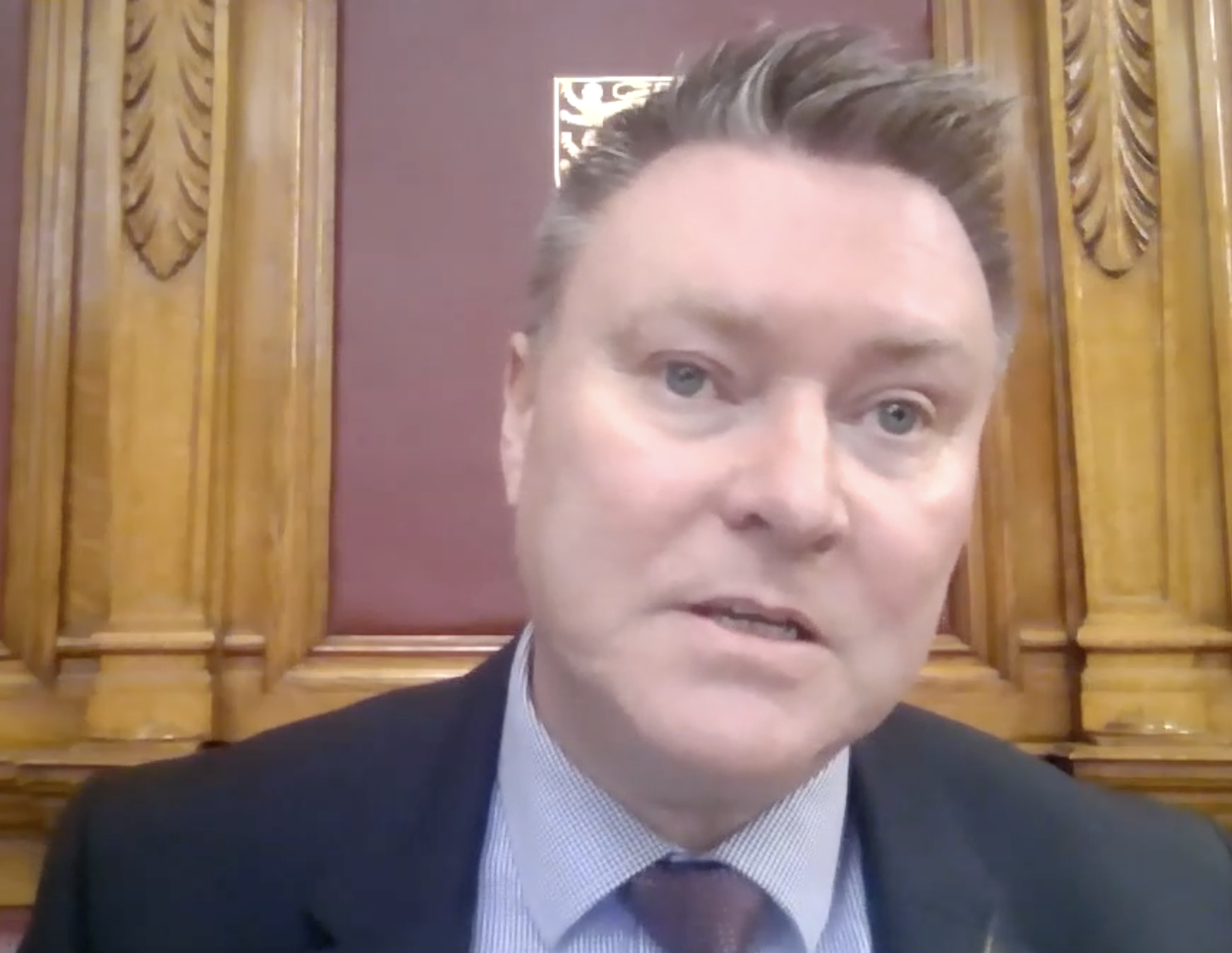
The member of Reform Jersey, which has already announced that it will support the Scrutiny amendment, said that there was not enough information in the OBC for him to back it, particularly what was included in the contingency and other costs over and above the £311.7m for the main works.
He said that the amendment did not stop the building of a hospital; it did, however, ensure that the Government would have to come back to the Assembly if funding exceeded £550m.
“If the borrowing goes wrong, we have one fallback, which is austerity. When going gets tough, most vulnerable becomes the target to pay that back,” he said.
“We cannot leave this to chance. If the Government comes back and says ‘we need more money’, we should consider that. This amendment does not close things down.”
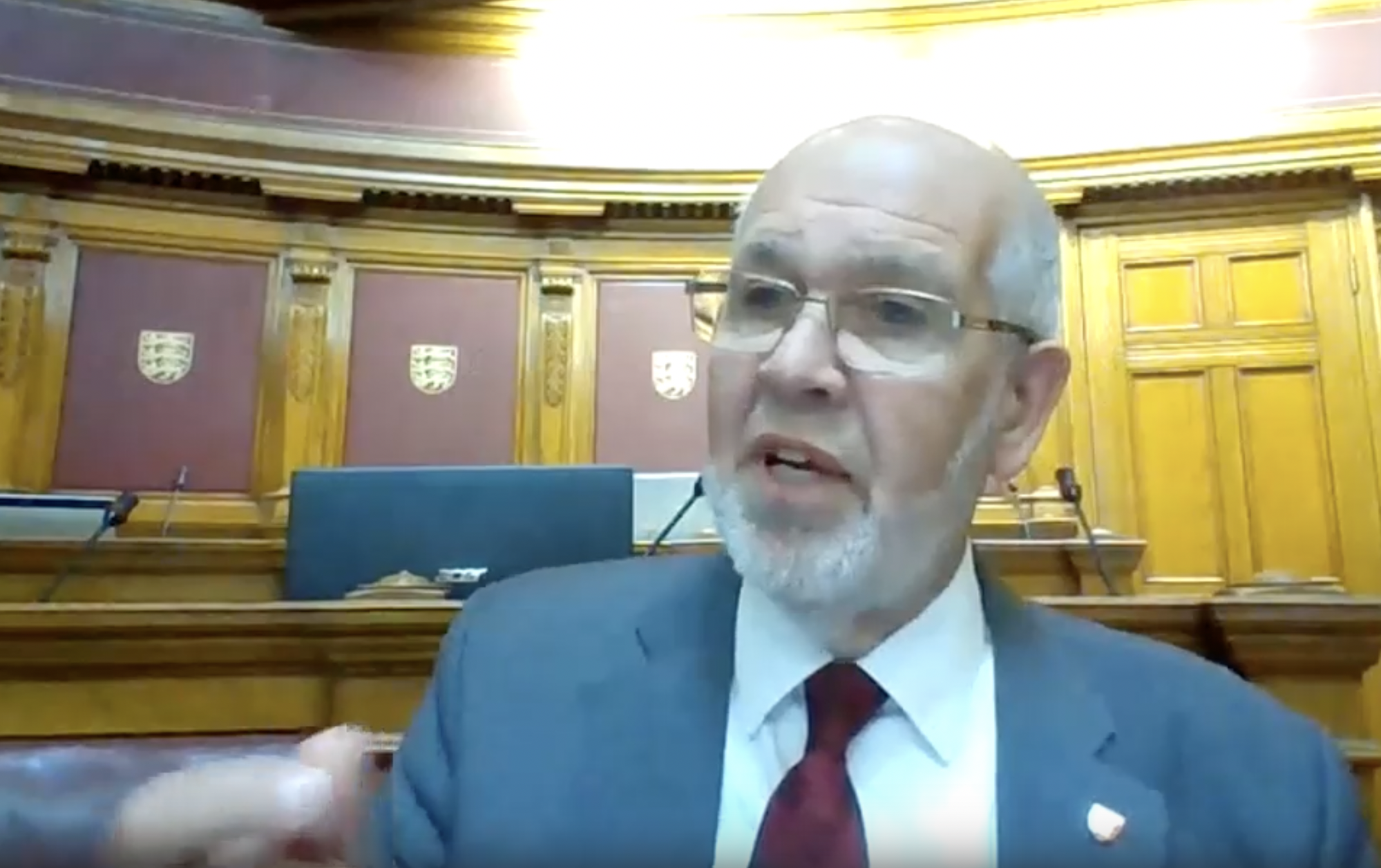
Although the need for a new hospital has been agreed, the Health Minister returned to the issue of the state of the current hospital, echoing a speech from February this year as he went into detail about the condition of the building, roof and systems.
Among his examples of its run down state, he explained how parts of the roof had previously blown off, and that just last week, urgent repairs were needed when tiles had come down in the strong winds. He said the single-glazed windows frequently let water in, left rooms too cold in winter, and so hot in summer that hospital staff had to give out lollies and ice creams to patients.
Turning to the motion on the table, he said that comparisons with the former £466m project could not be drawn as that cost did not include a mental health facility, which would have added £45m four years ago.
He added that Scrutiny’s suggestion that the building of the ‘knowledge centre’ be delayed, in order to reduce the overall cost, would have a significant impact on the recruitment, retention and wellbeing of staff.
The design of the new hospital, including its atriums and courtyards, was also integral to its design, he said.
“I don’t want it to look bland and monotonous; I don’t want it to look like an institution. I want it to be a building of some beauty that we can be proud off, because there is a large body of evidence that a building’s design has a substantial impact of wealth and being of its occupants.”
Constable John Le Bailly said he would be supporting the Government and voting against the amendment.
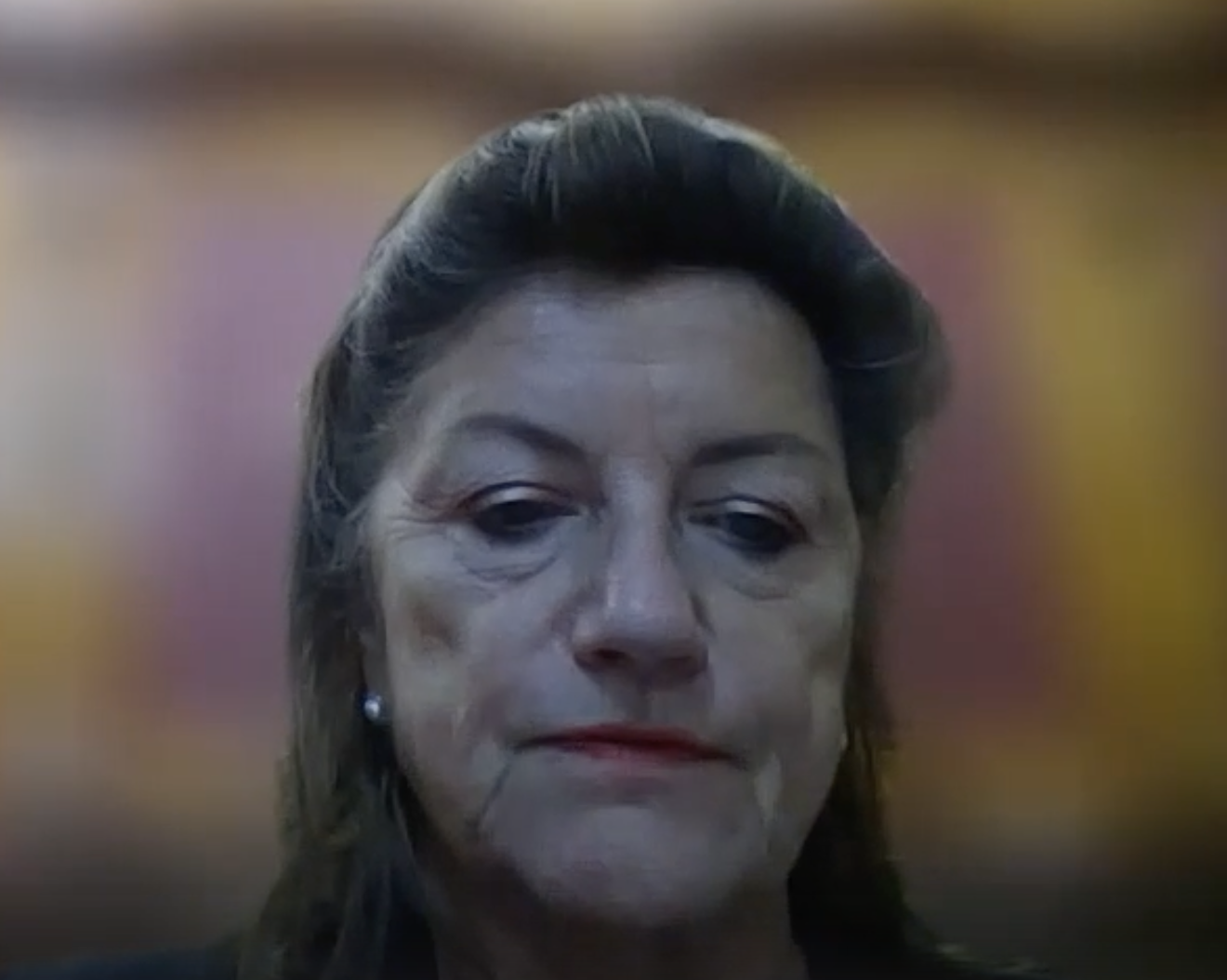
In a brief speech before lunch, Deputy Pinel said that the Scrutiny amendment was "misleading".
She questioned the validity of polls that had shown that islanders were overwhelmingly against the funding proposal, and said the the Government's economic advisers, the Fiscal Policy Panel and the Treasury Advisory Panel, had both supported the borrowing plan.
The £805.4m, she said, had been properly costed and it was not a figure "arbitrarily plucked from the air".
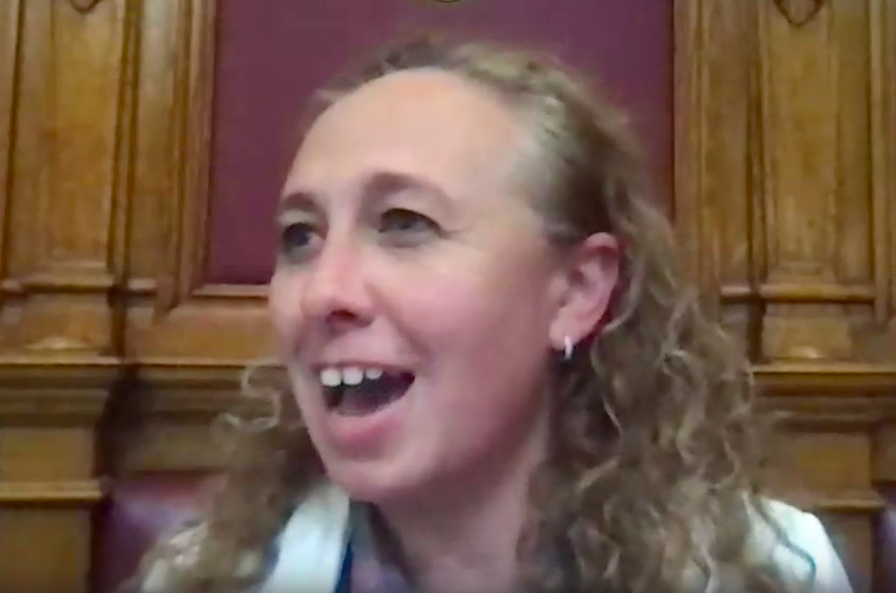
Deputy Gardiner started her speech by making it clear that she was not against the future hospital project, but that her support for the amendment was driven by the "confusion" surrounding the project and its costs.
She outlined how the Government's predictions for the size of the development had repeatedly changed, going from between 67,000sqm to 69,000sqm in August alone, before it announced in September that its "smarter and smaller" hospital's size had been reduced from 73,000sqm to 69,000sqm, with no reduction in cost. "Confused? You should be," she said.
She said that, according to the figures seen by her Scrutiny panel, the project's build cost worked out as £311m. "So how did we manage to get to £500m of associated costs?" she asked, going on to lament that the States Assembly was being asked to sign off £804m "without any clear understanding of how this figure has been achieved."
Deputy Gardiner went on to raise concerns with the decision to make the new hospital 75% single rooms, explaining that more staff would be needed and that no plan had been provided on how staffing arrangements would be managed and funded. "We risk patients being neglected in single rooms," she said.
Turning to the Government's proposal to finance the entire £800m project through two bonds due to historic low interest rates, she concluded: "Remember, bond finance is not free money, irrespective of how cheap the money is."
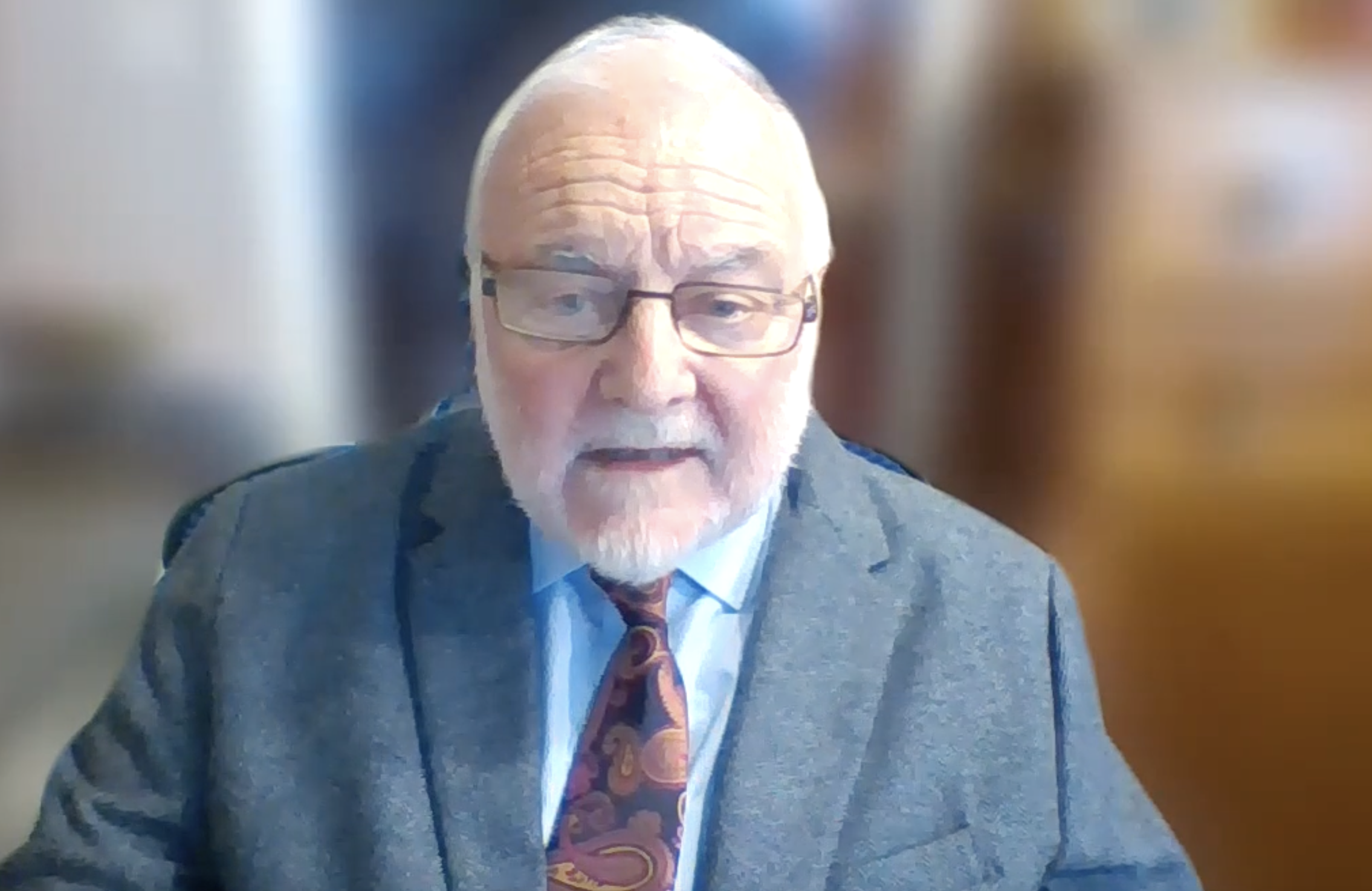
Deputy Pointon argued that supporting the bid to cap spending at £550m would see the "can kicked down the road" and a "significant further delay to the project".
He said he was particularly concerned that much-needed modern mental health accommodation due to form part of the Overdale health campus would be "held up again or, worse still, not developed at all."
He went on to read a letter signed by clinicians ranging from nurses to physiotherapists, midwives, podiatrists, substance abuse experts and learning disability specialists lamenting their working conditions, which see them use bathrooms for storage, forced to break bad news in inappropriate spaces, and go through the working day without an appropriate staff room to relax in.
The letter also explained that there is such as great limit on single rooms that health professionals face a "daily juggle" and have to "constantly move patients" around, adding that they would prefer to be "hands on with patients, not hands on moving beds and equipment just so we can deliver the most basic fundamentals of care."
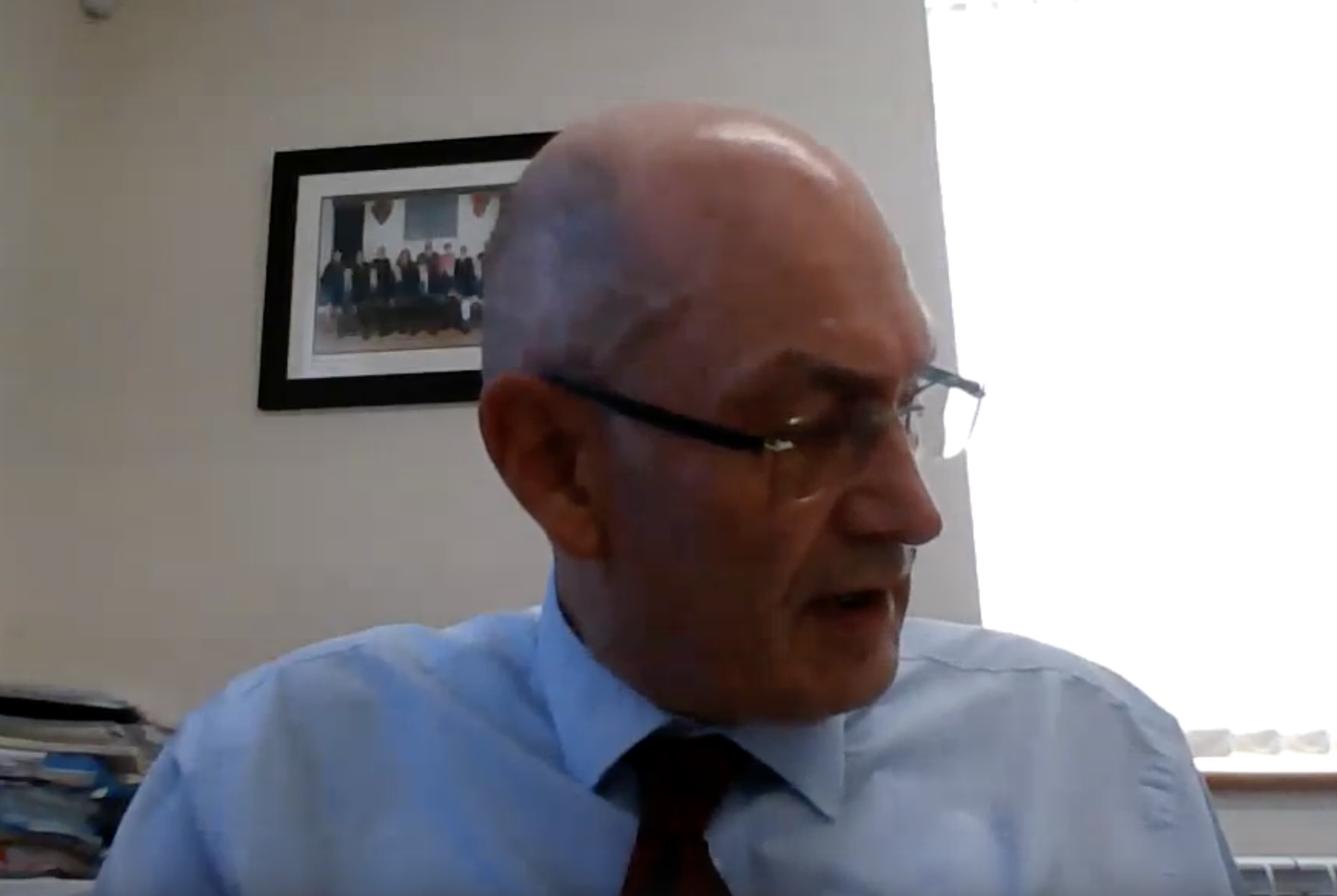
Assistant Chief Minister Constable Richard Buchanan was firm that the Assembly should reject the Future Hospital Review Panel's bid to cap spending at £550m.
The panel had argued that, in order to bring down the overall spend, "beautification" of the site could be curtailed, and the private patients provision could also be revisited.
Rebutting these points, the Constable said that the island was aiming to attract top medical professionals to the island and that private work would be an incentive, while such a provision would also fit well with the private health insurance arrangements common in Jersey's finance industry. He also urged States Members not to underestimate the impact of a health site's appearance on a patient's mental health, which in turn can impact recovery.
Turning to finances, he said that Scrutiny's proposal would mean "tighter contingencies" for the project, asking: "Is that prudent?"
Constable Buchanan also noted that the Panel's own experts, Currie and Brown, had concluded that the Government's estimated build costs for the new hospital were "appropriate for the site size" - "If the size is correct, then the costs are also in proportion," he mused.
Noting that "our portfolio survived covid markets through good stewardship", Constable Buchanan concluded that there was no reason to believe that good financial management would not continue, and that the island should seize the opportunity to borrow when interest rates are at an all-time historic low.
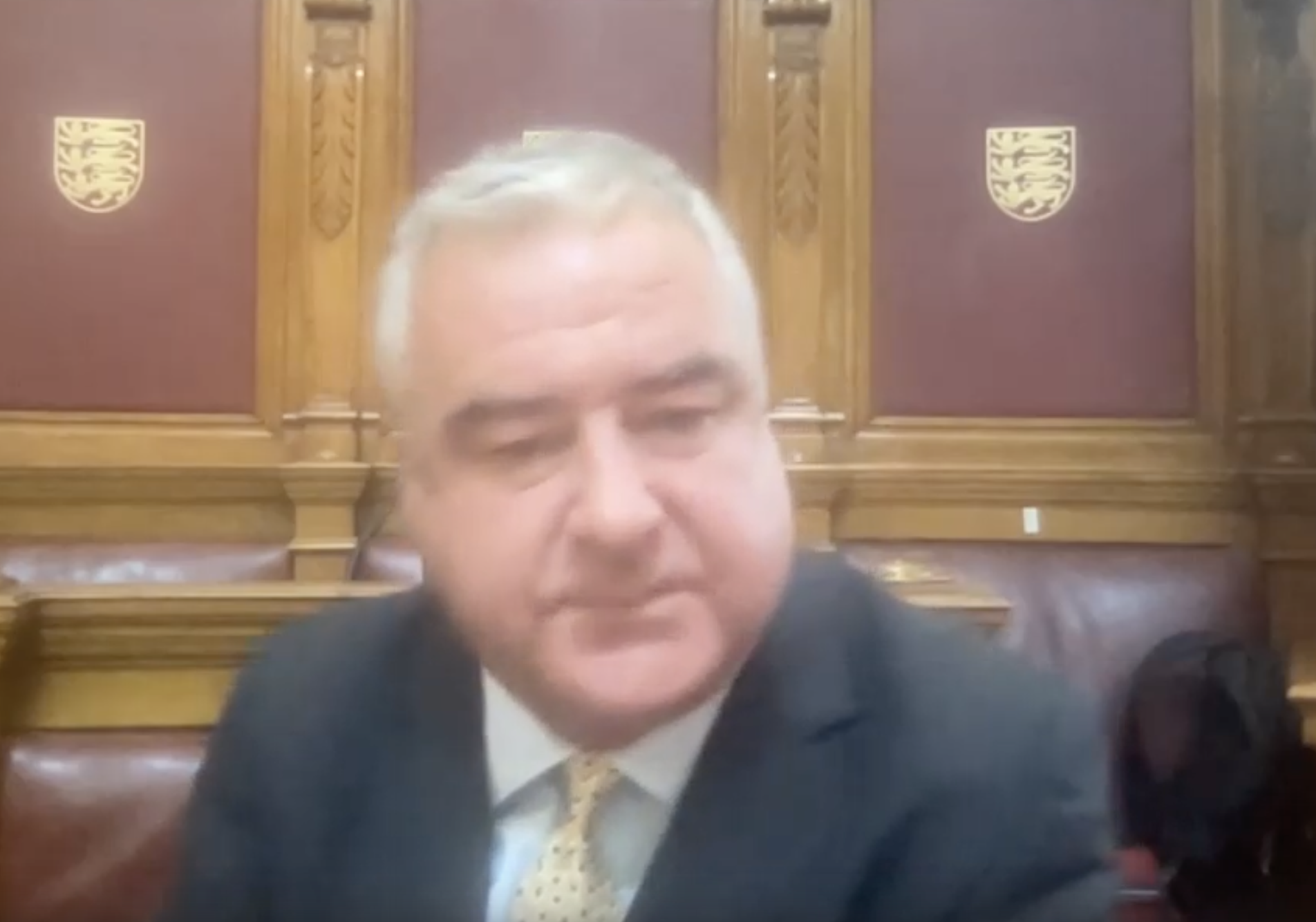
The Housing Minister - who himself was behind the 2019 motion to take the current Gloucester Street hospital site off the table - appeared to become angry as he pondered the "uncertainty and delay" to the hospital project that cutting its budget may cause.
"I don't want to have to wait another two years to release [Les Quennevais land for housing]," he shouted.
Having touched on how clinicians had previously reported their dissatisfaction at the previous plans to build on the current hospital site, he also hit out at "some supporters of this amendment" for whom he said "a flame still burns - a hope... of a return to Gloucester Street."
Senator Steve Pallett and Deputy Steve Luce - together representing the Progress Party in the States Chamber - are the only politicians to have publicly supported this idea.
In opposing the amendment, the Social Security Martin took aim at the Future Hospital Review Panel's "evidence" that many members of the public were against borrowing £800m.
"I'm surprised they only got 130 letters," she said of the number of responses received from the public, going on to say that their call for views was "like saying, 'Do you really want to pay all your tax this year?' 'I want to pay half, give us some views on that!' It's not evidence, it's really not evidence."
Referring to the Public Accounts Committee Chair's concerns about future staffing issues, she added: "We know Deputy Gardiner said that retention of staff is hard - if this goes south today, it will be even harder."
Noting that a smaller budget would inevitably mean a smaller hospital that doesn't live up to desires for a "future-proof" health campus with a mental health facility, she concluded that the Panel's push to cap spending was a "wrecking amendment because we cannot get all that's been worked out into a smaller box."
Constable Vibert said he would be supporting the amendment.
He said he had reservations about the fact that the Government would be borrowing around 80% of its reserves, but said that, with proper checks, any risk should be able to be managed.
The former minister and now member of the Public Accounts Committee raised a number of questions that she wanted ministers to answer, including the rationale behind the £73m ‘client contingency’ cost, and why the OBC had not included value-for-money has a ‘critical success factor’, as highlighted by Scrutiny’s own advisers.
She accused the Government of ‘holding Members’ feet to the fire’ in arguing that accepting the amendment would lead to irrecoverable relays.
Reform Jersey's Leader began by “congratulating the Government on what has been masterful exploitation of the mother of all strawman arguments”.
This, he said, was to turn a “legitimate debate on level of debt” into a one “against people who want to delay hospital and those who want it to carry on”.
“But there is no dichotomy, whatsoever,” he said.
The thrust of the Senator’s argument was that there was not enough information on which to base a decision committing the Island to a “substantial” amount of debt.
“I am one who really does want the project to go head; I am fed up with debates on the hospital,” he said. “But the reason I can vote with a clear conscience today is because I just don’t buy it that this amendment will delaying the project.
“The Government had not provided adequate information. If, further down the line, the £550m limit is not appropriate, there is nothing to stop Government coming back and getting approval for more, providing they make an adequate case.
"Ideologically, I have no problem with the Government borrowing lots of money; I want to see first-class health facility. However, I am not prepared to be ground down and allow the Government to make this decision without enough information."

Appearing from his home where he was self-isolating pending the result of his post-travel covid test, the External Relations Minister and former Chief Minister said he had supported a new hospital in so many guises he had forgotten how many times he had voted ‘pour’.
“Clarion calls told us each time a site was allocated that there was a cheaper one around the corner. Unsurprisingly to me, each time it has been proven to be incorrect.
“We have come around again, Overdale has been voted on and I have voted ‘pour’. But every time progress has been made, voices have been heard that there is a better site.”
He added: “If we are to deliver this mammoth project it needs slow and steady progress and it needs a substantial budget; that is what ministers are asking the Assembly today.
“Those who were against in the past and now in favour of making progress: those are right, sir.
“I don’t like borrowing, and I don’t think the Government should borrow lots and spend lots. I have been lone voice in challenging the level of borrowing, which has been difficult for me. We have hospital proposal and but we also have borrowing for Covid debt and other costs.
“I have had frank discussion with colleagues, and I find myself making a difficult decision. I see the rationale and good financial practice that borrowing for capital investment in low interest environment with rising Strategic Reserve income makes good sense, but I have always been concerned about rising borrowing.
“In supporting this borrowing, makes it difficult for me to support other borrowing in the Government Plan.
“Therefore, I understand all the arguments. Is it right to borrow for the hospital for a capital project to keep this project going forward?
“The only logical conclusion is yes but in doing so I put Members on notice that means I cannot support the borrowing in the Government Plan.
“I ask other Members concerned about borrowing to bear that in mind.”
The Constable of St. Martin, who is Vice-Chair of the Public Accounts Committee, said she felt the Government was holding a gun to her head.
She said she supported Overdale as a site but she may support the amendment, citing a lack of leadership and unknowns in the Outline Business Case on contingency.
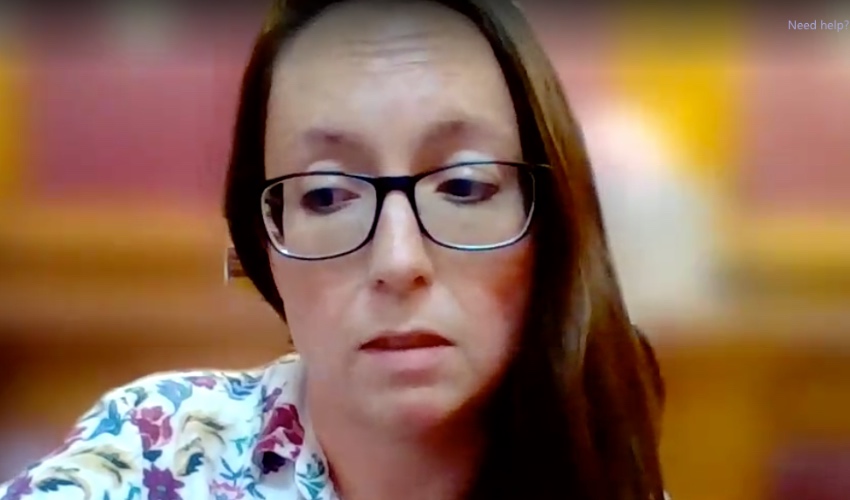
The backbencher said that for her, the turning point of the debate was when Health Minister Richard Renouf “implied that, if we don’t reject this amendment, maternity and paediatric services will duffer in the future.”
“I was disgusted by that implication, and it doesn’t fill me with confidence that the Government has got control of this project,” she said.
“Scrutiny is simply saying that this is the amount of money that we are prepared to commit to, and I am minded to support the amendment,” she added.
The Constable of Trinity - a member of Senator Farnham's political group leading the hospital project - said that the Assembly was the “last chance saloon” and, if the project did flounder “finding a delivery team for a fourth or fifth attempt would be remote”
“We are fishing in an ever-reducing pool of talent,” he said, adding that he took comfort from the knowledge and advise of Treasury officials and professional advisers.
“I can assure Members, that the Political Oversight Group have challenged the project team on timescale and costs. This amendment promises half a job, which is half a job that will never happen. It is nothing short of a wrecking motion that takes us back to the drawing board.”
A member of the Future Hospital Review Panel proposing the £550m spending cap, Deputy Mary Le Hegarat questioned aloud in the States Assembly why there would be an increase in private beds when there had been no consultation as to whether patients with health insurance would rather stay in Jersey or travel to the UK.
She further decried the uncertainty around the recently revamped Child Development and Therapy Centre, which is currently based at the Overdale site.
“They will move out to Les Quennevais for five years and, Sir, they are not due to come back and don’t know where they’re going either.”
With this in mind, she shot down the Government’s previous suggestion that the Overdale build would be a “one-site hospital”.
Having referenced current staffing shortages which led to a decision to cancel elective surgeries over summer, Deputy Le Hegarat questioned how the Government proposed to fund “meaningful pay increases” for the health and wider civil service workforce given that the island will be in “substantial debt” for the next 40 years.
Senator Ferguson, who is also on the panel, said she was “well aware that we desperately need a new hospital”, but suggested that what the Government was proposing was not appropriate.
“We need a good General Hospital with room for expansion – not a ‘world-class’ hospital, though I note it is now described [by Ministers] as a ‘first-class’ hospital, so it’s come down a grade,” she said.
Following some confusion over whether other States Members were talking in the background of her speech (in fact, it was reverb from her own microphone), the Senator went on to suggest that measures to improve productivity should be considered to drive costs down, and argued that it remained more cost-effective to send many Jersey patients requiring surgery to the UK, where they would be able to access the latest up-to-date procedures.
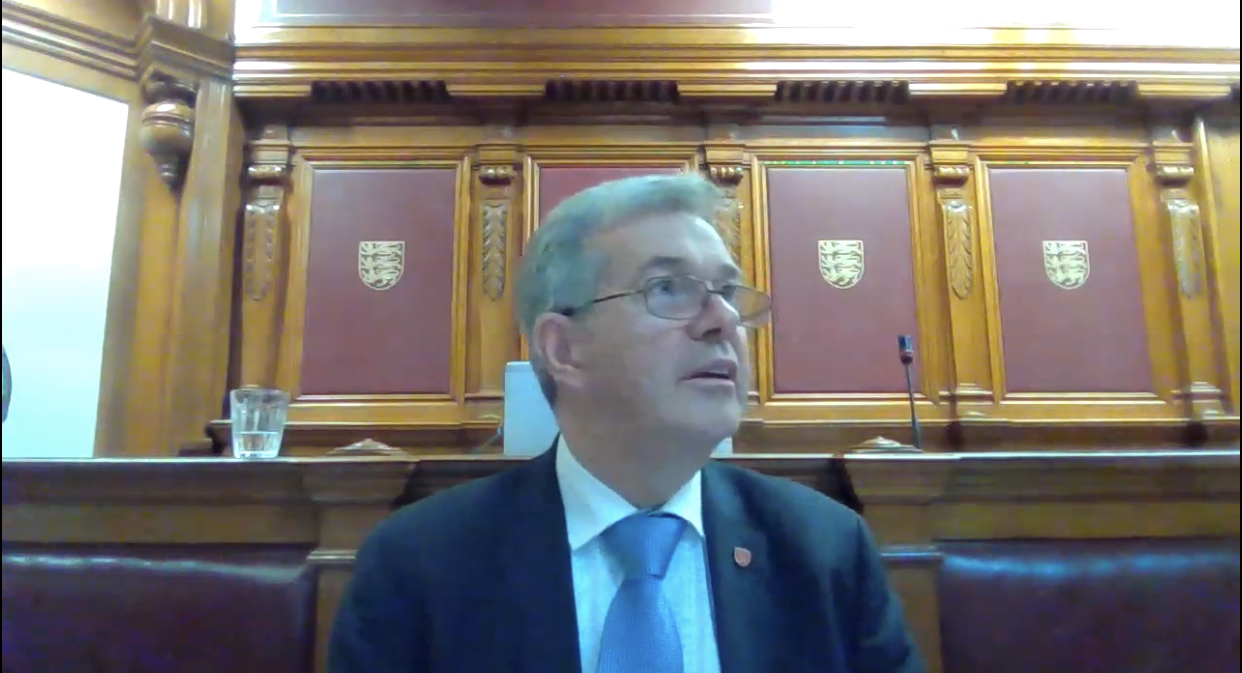
“In the long-term, we are all dead and yet we still plant trees for the future,” the Chief Minister opened his speech. “…That’s what we’re being asked to do today.”
Suggesting that some States Members were “not prepared to look to the future”, Senator Le Fondré argued that the “generational” vote should not be about “short-term political expediency or voting against me as Chief Minister or the current Government just to give them a kicking” but securing the future of islanders over the course of the next 40 years – “the next 10 Governments”, as he put it.
Referring to the controversial Queen’s Valley debate during his father’s time in the States Assembly, Senator Le Fondré explained how politicians were told that “we were hours away from running out of water.”
“Here, we have a hospital where we have been told in about five years time the state of that hospital will be sufficiently bad that we may have to close bits of it,” he said.
“That’s not a ‘gun to a head’,” he said, referencing previous comments from Senator Moore, “That’s being honest and straightforward.”
A planning application, according to the Chief Minister, is due to be submitted by 15 November.
“To get the rubber out and start redesigning it in six weeks [if the amendment passes] ain’t gonna happen,” he warned.
Raising his voice, he slammed the Panel behind the bid to cap spending for not specifying how a lower cost could be achieved or what should be removed from the current site plan.
Of evidence, he near-shouted, “there is nothing.”
Instead, he said, the Assembly should heed the advice of experts like the clinician leading the project, Professor Ashok Handa, who he noted was a consultant vascular surgeon who had recently received a lifetime achievement award from Oxford University.
The key element of his argument, however, was that borrowing £800m would allow the Government to avoid touching its Rainy Day Fund – allowing it to grow £1.7bn over the hospital’s lifetime.
This, he said, would in turn allow the project to be paid for without having to put up taxes.
At this point, it was 17:24.
While the States Assembly could have voted to continue to wrap up the debate yesterday evening, Senator Farnham proposed that States Members adjourn and continue tomorrow morning.
The motion was accepted, with some States Members welcoming the opportunity to reflect on the matter overnight.
The debate resumed at 09:30 on Thursday morning, starting with the Infrastructure Minister...

Deputy Kevin Lewis - a member of the Our Hospital Political Oversight Group - said that whilst he was initially in favour of the new hospital redeveloped on Gloucester Street, he acknowledged that there “problems” with this project such as disturbance to patients with noise and the 1793 wing’s protected status.
He added that “any rebuild there would only last ten years.”
In comparison, he said that any build at Overdale would last at least 25 years before “any major modifications” were needed, and that the hospital must be built with “a clean sheet so everything can be planned meticulously.”
He said that to vote for the amendment would only delay the building, and that while it would cost a lot of money, it would last “well into the future.”
He said that he would like to see it named the Queen Elizabeth Hospital.
A member of the Scrutiny Panel, Deputy Johnson said he wanted to restate the main object of the project was to “restrict the size of expenditure on the hospital” and restrict the amount of borrowing, and that there was no need to re-look at the site.
He argued there was not “sufficient information” to determine whether the expenditure proposed is appropriate, and while they can see that the range of costs for the building of this size is not inappropriate, what is queried is whether the size is appropriate for Jersey.
Arguing for scrutiny’s amendment, he highlighted the risk around the current plan for paying for the hospital by comparing it to his own personal circumstances.
“In the 1990s when I purchased my own property, I did so in what was then a recognised way with assistance of an endowment mortgage scheme,” he said.
“As far as capital repayment is concerned, that is secured by a life assurance with profits policy, where your life is assured for the amount you borrow and for the fixed term of the mortgage, and on the basis and the anticipation that after the period of 20 years or whatever it is, the value of that fund will not only be sufficient to discharge the capital sum but give you some element of change to help you in your retirement.
“In my own case, the deficit at the end of the period amounted to one third of the total borrowing and left me with what I should say is a challenge.
“And I raise that point… to suggest that the matter of funding we have here is in a way equivalent to an endowment mortgage.
“We are borrowing against the perceived and hoped for increase in value of the fund - and yes if all goes well if all goes well it will be sufficient to discharge, but if it does not, we have a problem, and more to the point, our children and grandchildren will have a problem.”
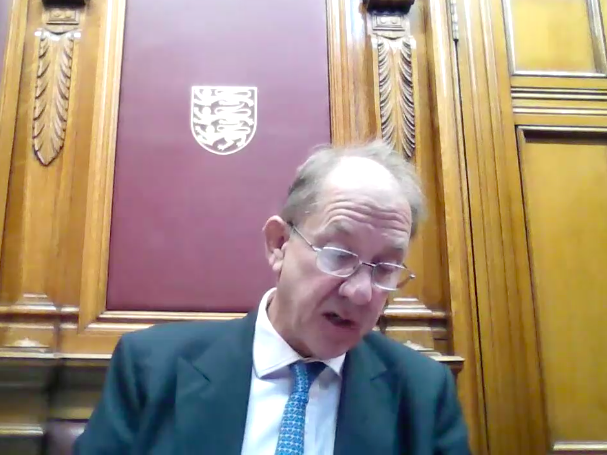
Deputy Rowland Huelin argued Jersey had to grasp the low interest rates currently on offer.
“We have opportunity to secure finance an all time low level - let us remind ourselves that our fellow crown dependency, Isle of Man, secured 400m at 1.625 just two weeks ago - we really must appreciate what a bargain that is, and will not continue forever,” he said.
“Jersey, as we know, is not in control of is interest rates, so we must look to the UK for our indicators. It is clear the sooner we’re allowed to go to the markets, the more likely we are to secure something similar.”
He added that it was “really important to realise it will be fixed price for the entire term, fixed for 40 years, no inflationary costs at all,” and that the island can “repay with minimal or no consequences.”
He said that he found it “concerning” scrutiny’s advisors were happy with the current funding strategy, and that it was a relatively small number compared to £16 billion which will be spent over the next 40 years on healthcare.
He also said ti would take another 18 months to 2 years to reverse engineer the clinical requirements into a lower fixed budget, and voiced his concern about acquiring another design and delivery partner.
Concluding his thoughts, he said he felt scrutiny’s amendment was a “vote of no confidence” in “hundreds” of the island’s clinicians.
The Children’s Minister echoed Deputy Huelin’s thoughts, saying the Scrutiny team had not properly spoken to clinicians like the Our Hospital team had and that there was “no evidence” that it would not cause a delay.
He slammed the amendment as being “ill advised,” and said “I’m shocked by this amendment, shocked by the disregard it’s given to our health professionals, I’m shocked at the disregard it’s given to this island and I’m shocked by the disregard to this Assembly.”
He added he was “shocked” at any member that would vote for the amendment too.
Constable Sadie Le Suer-Rennard followed Deputy Wickenden by saying he would be “very upset” with her, saying that Scrutiny had done their “homework” and that she would not be “blackmailed” into supporting the Government by voting against the amendment.
She said she found where they are with project today “very disappointed,” and had many calls from the public panicking about the amount of money being spent on it.
She also voiced her frustration about the closure of Simon Sands, saying that it would be one of key reasons costs would go up for the project in the future.
Senator Steve Pallett reiterated that he and the Progress Party understood the need for new hospital facilities, but that the policy they would stick by is that it would be better to reinvest in the General Hospital.
Discussing the current proposals, he said he did not think they were "reasonable," and that he would be supporting Scrutiny's amendment to limit the spend.
"It really worries me the direction we’re going in in terms of the level of borrowing. I’ve got not issue about government borrowing if it’s the right level of borrowing and it’s for the right purpose," he said.
"I think borrowing is for a reasonable purpose, and I no doubt about that, but what does worry me is the level of borrowing.
"What we could end up with… is unprecedented borrowing, not only is going to have an effect on the ability of future governments to be able to plan and be flexible in terms of what they want to deliver."
He added: "I think will undoubtedly have an impact of islanders moving forward - my children and grandchildren… I don’t want to overburden them with having to pay for that."
Deputy Young said he had played no part in hospital discussions at the Council of Ministers but added it would be inevitable that the project would be delayed if the Scrutiny amendment passed.
This would lead to a rushing of the planning inquiry, which will be carried out by an independent inspector, and could lead to wrong decisions being made.
He also said a delay would badly impact staff retention and recruitment at the current hospital. The minister that he had changed his mind on private healthcare, once thinking it was wrong but now seeing the value of the revenue it brought in.
He added that any delay would push the project into the next Assembly, which was not acceptable.
Deputy Geoff Southern
The Reform Party Member it did not make sense that contingency costs were 1.6 times the cost of building the hospital.
He added that it was not the role of Scrutiny to come up with alternatives to Government plans, such as what should be dropped if the budget is cut from £804.5m to £550m; rather it was the role of backbenchers to question and examine, and there they had rightly concluded that there was not enough information to make such a significant decision.
Assistant Minister Lindsay Ash said that while agreed the island could have a cheaper hospital, it would not provide the island with the best facilities it could have.
He asked the Assembly "Should we offer the island a first class offering or a second class one?"
He continued with this rhetoric, suggesting cuts that would have to be made if they were to go for a cheaper hospital.
“Should we perhaps offer less on island treatment… should we cut the number of operating theatres and treatment rooms, which would probably then extend waiting lists rather than shorten them as we are currently waiting for them to do?”
“Should we just have wards rather than en suite facilities providing privacy and dignity?”
He reiterated the point that the island was in a position to borrow at "some of the most competitive rates" the island has seen, and a "fixed rate loan over 30 or 40 years gives you security over your project costs."
Constable Jackson said that he "categorically" supported the construction of a hospital at Overdale, but that the Outline Business Case presented did "not instil confidence" in him.
He said there is "absolutely no certainty" a new hospital will cure staff shortages, and that perhaps the Assembly should spend less on the project and pay them better.
He explained that this "has been catalysed by what could be described as obfuscation when detail has been requested, either because the detail of the request was been unknown or simply through unwillingness or lack of understanding.
“Requests for the costs of facility management have been met with a response that ‘we’re working on it, but we hope that it will be less than it at present because we’ll have a new building.
"That simply isn’t good enough and leads one to surmise there are hidden agendas to outsourcing services."
Giving another example of uncertainties, he singled out the proposed private wing.
He said that while he was not against the principle, that the idea presented that it would bring in £10m per annum was not clarified as being growth or net.
He said: "How can we possibly make a decision on that basis?"
He concluded by urging members to support the amendment: "This amendment is not brought for political gain, it is not brought as suggested by some as a wrecking motion.
"It is brought as a result of a clear message from islanders who see the proposed budget figure excessive and the level of borrowing as being insane."
Deputy Graham Truscott said the Assembly should "unite" around Senator Farnahm's proposition and vote against the Scrutiny amendment.
He explained he was "assured" by Treasury Minister Deputy Susie Pinel's comments that the model going forward had been "fully stress tested" and that it "makes absolute sense."
Referring to Deputy Ash's comments too, he said he felt it was "a good time" to take advantage of interest rates bing at a "historic low."
Saying he wouldn't be supporting Scrutiny's amendment, he said he though it was "time to stop procrastinating, we’ve done that for far too long, it’s time for being positive."
Deputy Montfort Tadier slammed some of the rhetoric that had been used in the debate, taking issue with comments that Reform Jersey would vote for it, and had been pigeonholed as "socialists."
On the subject of the hospital, he said his "concern is how much" debt they are "saddling future generations with," and that the figures that the Government had presented didn't "stack up."
He expressed that he was "disappointed" the Government didn't just accept Scrutiny's amendment.
"I think if they wanted to prove to us that there should be no delay, rather than gambling on the strength of their argument and the strength of their figures."
He continued that: "they should have got round the table with scrutiny and actually said 'look, we can build this hospital for less and if there are areas where we need more money, we'll come back to the assembly and as when that spending is required with the relevant detail, and when we've made the case money will be released by the assembly when they're satisfied."
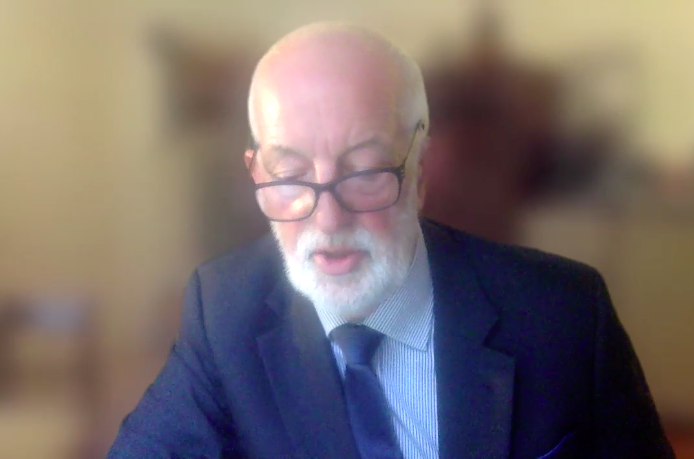
Deputy Steve Luce criticised inconsistent numbers given around the hospital project.
"The cost of mental health yesterday was £40m - 50m yet the table we were given on Monday showed its number as just over £12m," he remarked.
He also noted "the confusion over the percentage of islanders who have private healthcare, so Government can’t even agree amongst themselves as to the right number.
"Just like the ever changing design, the numbers we are given are all over the place, and not where members should expect for a debate of this gravity."
He said that he would not be supporting the Government and voting for Scrutiny's amendment.
He warned: "any of us that have any sort of business dealings right from buying a pint of milk up to funding large multi million pound developments, I say to you think very carefully about these proposals."
The St. Lawrence Deputy said that Jersey’s inability to set its own interest rates or print its own money meant that the Island had to be very careful when it came to debt.
He referenced a 2017 speech in the Assembly by Senator Le Fondré a number of times, when the now Chief Minister said that “debt is addictive and not part of Jersey psyche”.
Deputy Morel said that ministers’ proposals to borrow £1.8 billion – which included other borrowing included in the Government Plan – was a concern.
He referenced global geo-political forces to illustrate the uncertainty of the years ahead.
“The use of the Strategic Reserve over the next 40 years will be rendered uncertain because there will be limit to ability to refinance should we have future problems,” he said. “And the Treasury Minister has admitted that she does not have any plan if the reserve returns do not cover cost of debt.”
He added that, in the very worst case, the Island would have to turn to the UK for support if it couldn’t pay its debt and, if that happened, “that is the day the island loses its autonomy”.
He concluded: “Yes, I am cautious, yes, I am slightly risk adverse. Any amendment which tries to enforce fiscal discipline is one I support.”
The St Lawrence Deputy said this was the most important vote in a generation and each cost had been properly accounted for and scrutinised.
He said that, in this environment of low interest rates, combined with the performance of the Strategic Reserve, the Island was essentially getting a hospital “for free”.
"I do not think we can do a hospital for cheaper," he said. "This is a unique time in history: if a few things go our way, we can have it for free.
"We have fund that has achieved 6% per year for last 20 years. We have had the crash of 2008 and Covid but if you have long term fund, it is quite safe. It is a long term fund, like a pension. I wish my own money had done 6% a year over 20 years."
At £6,500 a square metre, he said the cost was lower that for residential property in Jersey.
He also laid out the consequences should the amendment succeed, including the difficulty of finding another independent planning inspector who had a knowledge of the island.
He finished with a challenge to the Reform Party, who are backing the amendment: if they switched their support to the Government, he would pledge not to stand in next June’s election.
Despite being a member of the Political Oversight Group, Deputy Hugh Raymond said he’d be voting against the amendment because of the time he had spent speaking to clinicians who had emphasised the desperate need for the new hospital.
Having emphasised that he had previously been on an NHS board and been part of a project to build a wing to a UK hospital, he said that when he became a member of “POG”, he pored over previous work undertaken on and debates around the hospital.
“From what I’ve seen from all reports, the number of personalities and discussion that went on over the last 10 years is exactly what is happening now,” Deputy Raymond said.
What was different this time, according to the Deputy, was that clinicians were more closely involved in the project.
He stressed that delays to the project would also mean Jersey faces extreme competition for staff and people to come and live here.
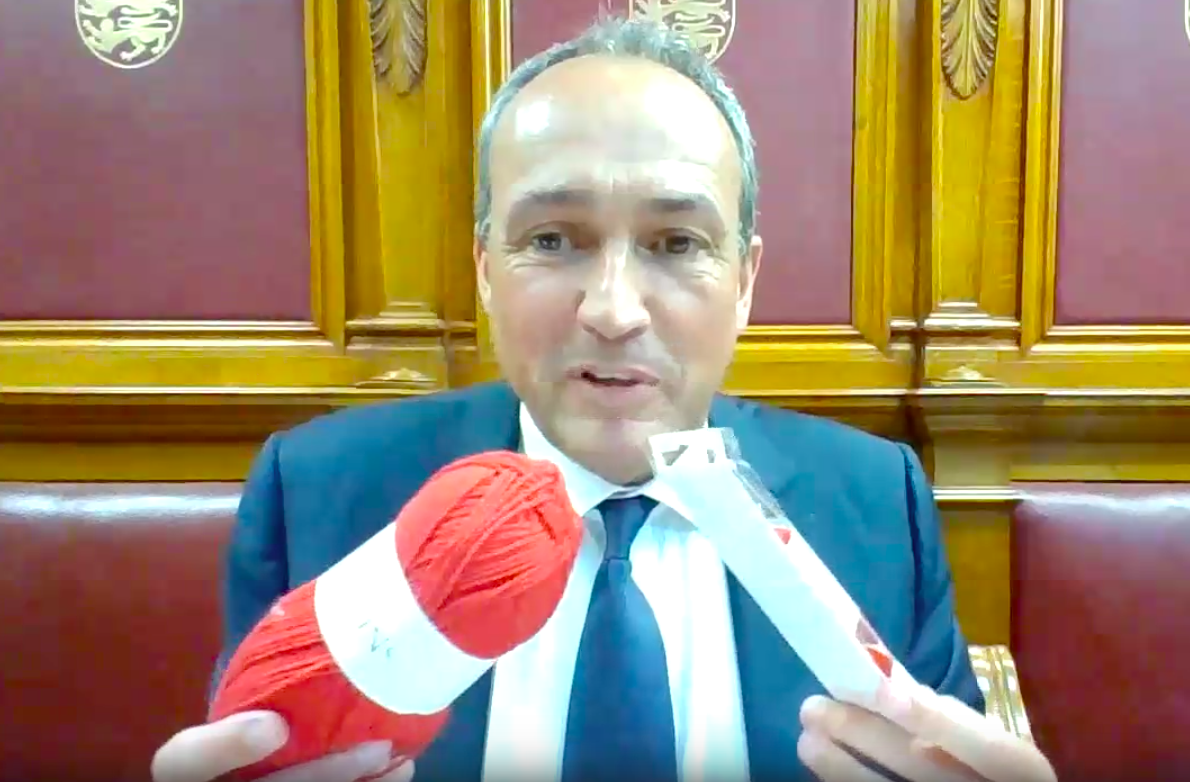
In an unusual turn of events, leader of the project Senator Lyndon Yarn-ham started his speech by telling the Assembly that he had learnt over the lunchtime break that Reform Jersey’s Deputy Rob Ward’s family had introduced him to crochet and that it keeps him quiet before producing red yarn and a needle and gifting it to him.
Getting down to the matter at hand, he was clear that Scrutiny’s advisers had only questioned whether the size of the proposed new hospital at Overdale is necessary – but had conceded that the budget for the current project was appropriate for the plans already on the table.
Capping the project’s budget, he reiterated, would mean a smaller hospital and this could result in a “less peaceful and healing environment.”
He went on to assure that the budget the Government had presented was “realistic and robust”, with appropriate allowances for future inflation and contingency costs.
Senator Farnham also assured that the Government were only purchasing the land and property “we absolutely need”.
He predicted delays to the project if the amendment were to pass would be in the order of 18 months, resulting in nearly two years of inflation on construction costs. He also spoke of how the cost of maintaining the current hospital would “escalate sharply” beyond 2026 – the current scheduled completion date.
Having addressed the “historic” low interest rates, the likelihood that the Rainy Day Fund would grow if left untouched, Senator Farnham said: “I’m not a gambling man, but those odds you have to admit are very strong.”
Taking out a binder, he explained that his team had provided “hundreds of pages of good quality detail” on why the project’s budget was necessary, and expressed his hope that States Members would heed this.
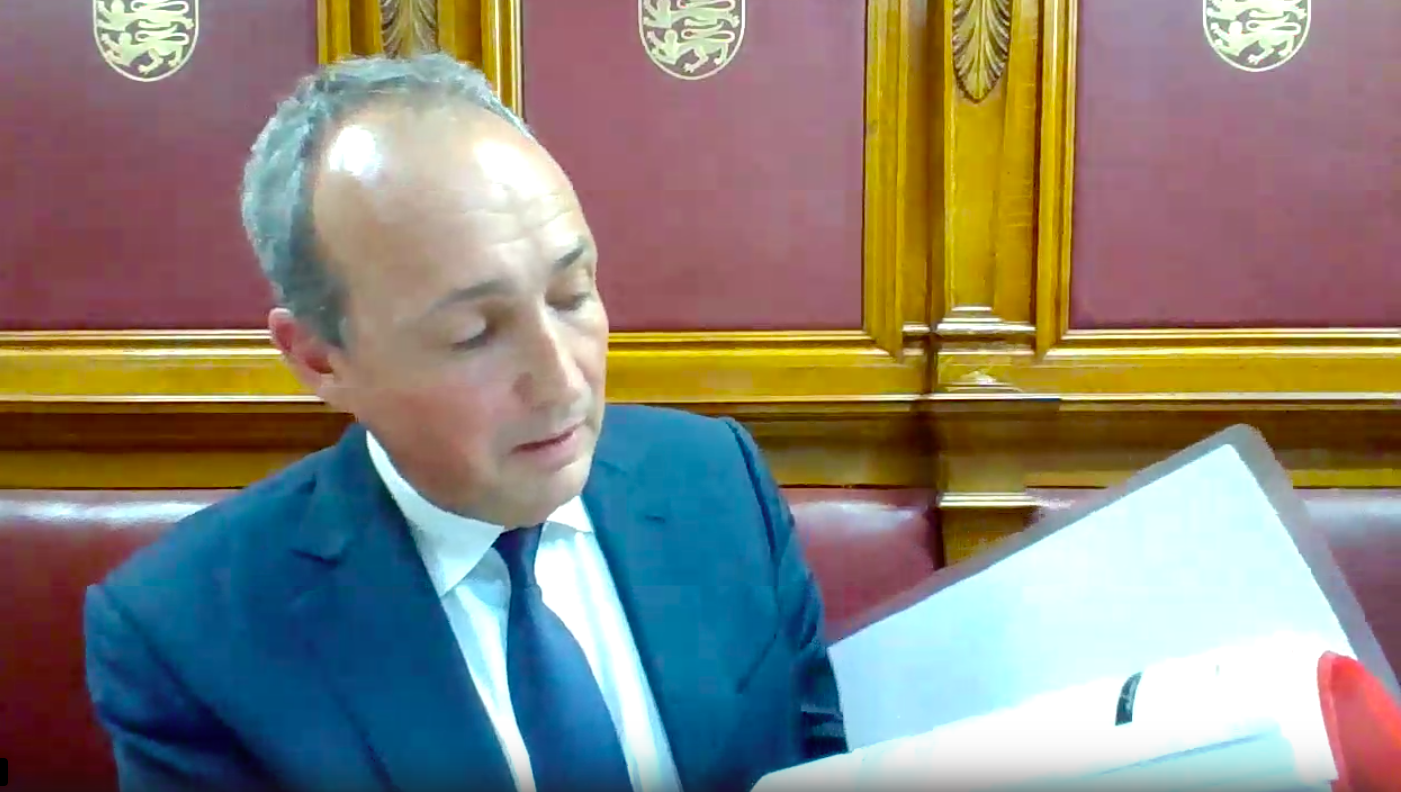
Concluding, he said that he could “not contemplate islanders’ reaction should we let them down again [by delaying the project]”, going on to add: “Let’s not step back… Let’s keep the momentum going for the sake of future generations.”
Constable Mezbourian’s opposition to the amendment was largely based around her concerns about putting off creating a new hospital any longer.
In an emotional speech, she explained how she was worried that “dignity is not guaranteed” for those seriously unwell on multi-bed hospital wards.
She explained how, around six years ago, she was visiting someone in a six-bay ward where every patient had visitors.
There, she noticed a family speaking behind a “drawn plastic curtain”, which was unable to “hide their distress” as an elderly family member passed away. Some attempted to conceal their upset by “smothering their cries”, she recalled.
“I will never forget how we all looked away as they finally left the ward walking past us all… What an awful situation, what an awful experience for everyone in that ward, particularly the elderly patients all of a similar age to the deceased.”
After marking himself as a “free-thinking” member of the Assembly upon whom lobbying efforts were “wasted”, Deputy Higgins said he’d be opposing the amendment over concerns that it could lead to “the whole project unravelling.”
He said he had voted against the previous plan to revamp the current hospital, but liked the current “campus” proposal. He said he wanted clarity from Chief Scrutineer Senator Moore over whether she backed Overdale as a site or would rather reopen the site debate.
Describing Deputy Guida’s speech as a “tour de force”, he went on to praise his “clear thinking” on the financial situation.
While he noted that, to some, borrowing was total “anathema”, he said that he was certain it was the best option.
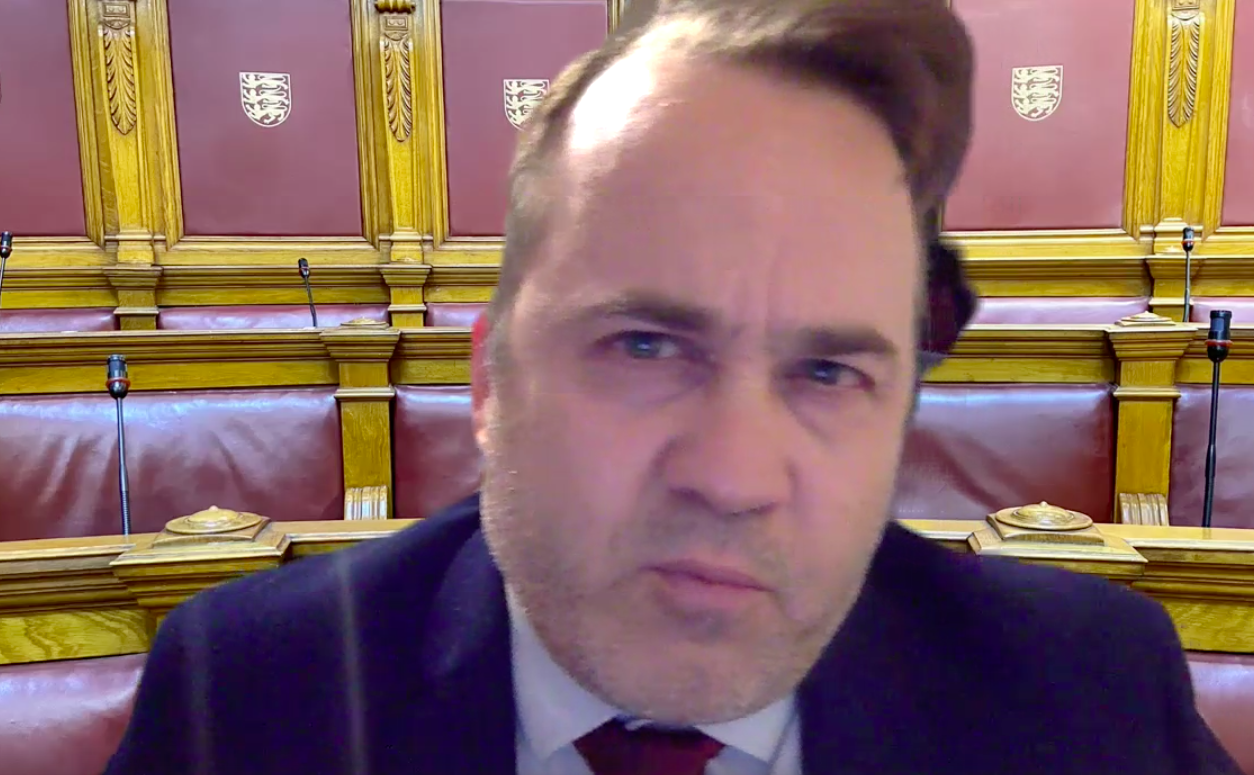
The Deputy said: "I look forward to hearing Senator Moore’s summing up because I have not made my mind up.
"I volunteered to spend a whole 24 hours two years ago, to learn how the hospital works. The one thing is clear: the building is our staff. I saw with my own eyes they going above and beyond more than they need to because they are in a position that should have been dealt with years ago.
"I saw at 3 am decisions being made when an islander came in and within 90 minutes he had passed away. They had to transform a whole hospital ward to make sure he passed away with dignity. I then saw the porter returning with the medical reports in a Co-op trolley. We have to just get this done."
Senator Kristina Moore, chair of the Our Hospital Review Panel.
Summing up, the Senator said: "What is clear is that we are united in our commitment to delivering a hospital for Islanders; what divides us is the extent to which we should commit public money to pay for it.
"Senator Farnham and the Council of Ministers argue that their project must keep pushing forward whatever the cost; Scrutiny, however, believe that the Outline Business Case is inadequate, and doesn’t provide the justification for a hospital of this size and scale.
"There is no workforce strategy, no accounting of running costs, no sustainability plan, no digital strategy, no estate strategy, and the costs could rise rather than fall.
"So, do we just get on with it, never mind the details? Or do we behave like an intelligent client, take a considered approach and push back on the very expensive team that are working on this project to ensure that this important building will meet the healthcare needs of islanders, without risking our economic future?"
The amendment failed by two votes, with 26 States Members voting against, and 22 in favour.
Click HERE to see the full breakdown of votes.
With that concluded, it's on to the main debate.
Despite having voted in favour of the failed bid to cap spending at £550m, Deputy Morel said he would be backing the overall plan to spend £800m on the hospital.
However, he appealed to Senator Farnham: “Please do try to bring the final costs of that hospital down, please.”
He said that many islanders feared that, while hundreds of millions had been budgeted in contingency costs, construction firms may see this as part of their budget.
“Every million that we don’t spend on that hospital is a million we can spend elsewhere,” he said.
Deputy Morel further put on the record his concerns that the hospital plan had been drawn up in the absence of States Members having a full view of how the new Jersey Care Model would work, and challenged Senator Farnham to reduce the number of parking spaces from 550.
He concluded: “Let’s get behind this now because we know that lots of us are not comfortable with debt, but we do need to be comfortable with the hospital.”

Having failed to gain sufficient support for her amendment, Senator Moore started her speech in the main debate by blasting what she described as “locker room” tactics from Government involving making deals behind the scenes.
She said that, while some States Members may think the political debate is a game, that it is “actually about lives, the fundamental provision of healthcare that everyone wants to talk to us about when we campaign to represent them in this Assembly.”
Senator Moore said that she would be voting against borrowing £800m for the new hospital “with regret”, saying that the plan was “not fit for purpose”.
She said that the Government “risks doing harm to the island by basing such a huge expenditure” on what she described as an “inadequate” set of proposals.
Returning to her opening theme, she said, “I simply feel that it is an impossible thing to vote for... Politics may require teamwork, but not locker room tactics,” and called upon her colleagues to “work with sincere passion and integrity as they continue their endeavours to the next election.”
St. Martin Constable Karen Shenton Stone, Public Accounts Committee Vice-Chair
Constable Shenton Stone, who had supported the £550m cap, said she was “disappointed but not surprised” with the amendment vote result.
She said that she would now vote in favour of the Government’s borrowing plan “with fingers crossed” and said that she expected “far more integrity and transparency from this Government”.
Concluding, she warned Ministers that she would be “closely” following their spending.
Lamenting that “sensible views have not prevailed”, Senator Ferguson said she would support the spending plan.
However, she had the following message for Government: “While we’re getting on with actually getting a hospital, please can we now turn our attention to making the system more efficient and improving productivity?”
Constable Mezbourian, who voted against capping the cost, said she did not expect the project’s final cost to reach its cap “let alone exceed it.”
She said that, if it was the case that the Government asked for more money at a later date, she said she doubted she would be able to support it.
Finishing her short speech, the Constable said: “I ask Senator Farnham to tell us now, will there be accountability if it is not delivered within the expenditure cap and if so, from whom?... Who will be accountable?”
It emerged in Constable Crowcroft’s speech that he voted with the Government – to turn down the £550m cap.
He said Deputy John Young’s speech “changed my mind because he really focused on the effect [of delaying the project] on medical staff.”
He said he thought people “will look up at the new hospital in a few years’ time and it will be a beacon of hope, reassurance and consolation.”
Taking aim at the Council of Ministers, he concluded: “I would ask the Council of Ministers to deal with St. Helier as it would with the other 11 parishes – with respect and consideration.”
Deputy Rob Ward
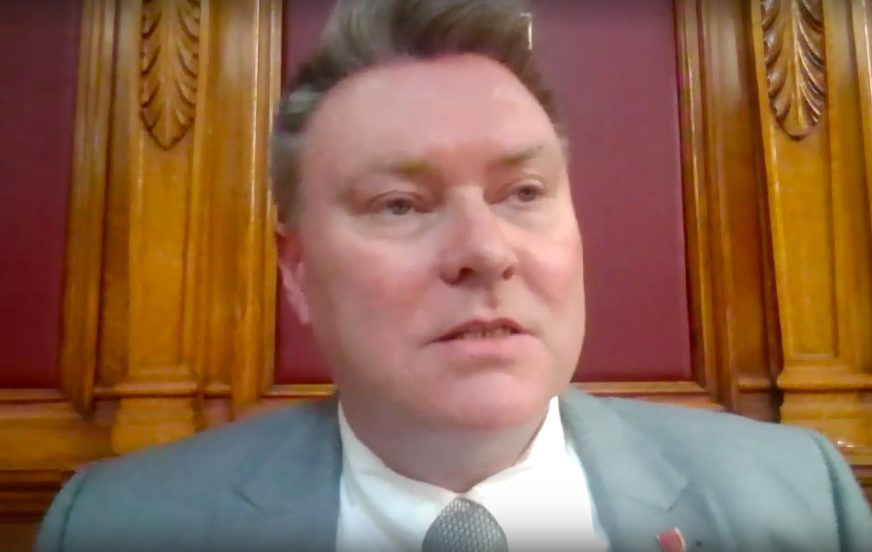
After thanking Senator Farnham for his yarn gift – but noting that he had supplied a needle that was “far too big for the woold” – he went on to place on the record his concern that the final cost of the project could be used for political gain.
He said he would be extremely disappointed if, just months before the election, members of Government suddenly announced that the overall cost would be much lower.
“That is a cynical abuse of Government money and borrowing for the wrong reason… If that happens, I will call you out on that because it is totally inappropriate when most of the arguments have been, ‘We cannot do this without borrowing this larger amount of money right now.’”
Highlighting that he understood the need for accountability with the project, Deputy Maçon - yesterday afternoon announced as the new Assistant Minister for Housing - said that he would be supporting the proposal and that he hoped all would get behind it “for our staff and for our people.”
The Reform Jersey politician said that, for him, this step would mark “a change in the nature of borrowing” Jersey had previously done.
He said that a bond had previously been used to fund creating housing, but noted that this “provides automatically an income stream you can service borrowing with.”
He concluded by saying he hoped that, if paying off the debt becomes difficult, he hoped that this would not lead the island to end up charging for health services that had historically been free.
Moving to address States Members’ concerns about oversight of future spending, she described herself as a “tight Jersey girl” and promised to monitor expenditure “extremely closely.”
Giving his support to the borrowing plan, Deputy Huelin stressed that his group were “the first line of scrutiny” and would “challenge every single stage” of the project as it went ahead.
Senator Sam Mézec, Reform Jersey leader
While Senator Mézec had been in favour of capping the project spend, and continued to express reservations about the Government's financing plan, but was nonetheless clear that he and his party were behind the ambition to get a new hospital built.
He said it was a “disgrace” that it had “taken 10 years to get to this point.”
Deputy Le Hegarat sought assurances from Senator Farnham that the borrowed £800m “won’t be utilised for any other purpose” or to “fill any gaps” in relation to the Government Plan.
She also urged the hospital project team to provide clarity on the long-term future of the Overdale-based Child Development and Therapy Centre, which will be demolished and moved to Les Quennevais during the hospital’s construction phase.
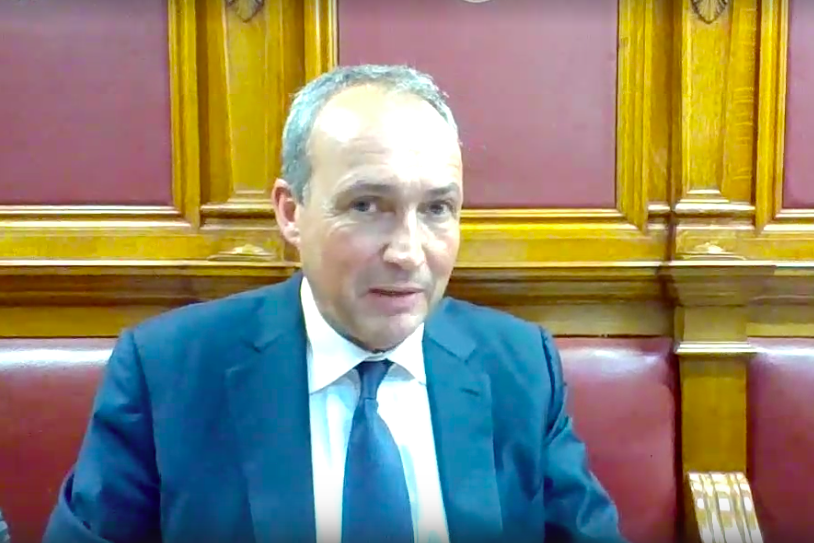
In a final attempt to rally States Members to get behind the project, he promised that the new hospital would contain the “very best facilities, very best value and very best care”.
The vote was taken in separate parts, but the key element - whether the Government should be permitted to borrow £800m - was approved by 32 votes in favour, 14 against, and one abstention.
The rest of the plan, which included giving the Government permission for compulsory spaces, and protections of green spaces, were also approved.
With the vote having passed, States Members adjourned for the evening.
A planning application for the new hospital at Overdale is due to be put forward within six weeks.
Click HERE to see the full breakdown of votes on the financing proposals.
Comments
Comments on this story express the views of the commentator only, not Bailiwick Publishing. We are unable to guarantee the accuracy of any of those comments.